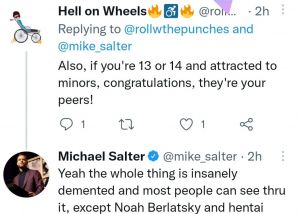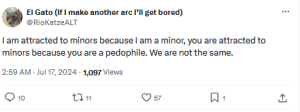One of our staff members is contributing considerably to a News Archiving service at Mu. Any well educated (Masters, PhD or above) users who wish to make comments on news sites, please contact Jim Burton directly rather than using this list, and we can work on maximising view count.
Debate Guide: Corresponding age attraction: Difference between revisions
New page: Whatever your age, it is generally seen as acceptable to 'fancy' an age peer - that is to express romantic or sexual love for children as a child, and possibly even to act on it in some mi... |
The Admins (talk | contribs) No edit summary |
||
| (33 intermediate revisions by 3 users not shown) | |||
| Line 1: | Line 1: | ||
__NOTOC__ | |||
<blockquote><font color="green">'''''It is both normal and acceptable for children to express a <u>childish sexuality</u>, but only towards one another. This is because erotic age preference naturally correlates with one's own age group throughout life, or at least until adulthood in the case of men. Youth who experience the same feelings as they become adults are abnormal and problematic, displaying <u>arrested psychosexual development</u>.'''''</font></blockquote> | |||
[[File:Corresponding.png|thumb|<small>One example, in which the responder seems to be confused as to the concept of [[pedophilia]], rendering it contingent upon the age gap and its social normativity, as opposed to physical characteristics.</small>]] | |||
A person's raw attraction to physical characteristics (and by extension, age preference) is unlikely to shift in line with their age, as they progress through puberty. While it is [[:Media:Pedophilia - Mark Normand.mp4|socially normative these days]] for minors to date among their school peer group and show their affection for one another, this says more about situational factors (proximity, experience, etc) and received standards than any inherent aspect of human nature. Western society forces minors into same-age peer groups thru the education system and indoctrinates them with the idea of an "age appropriate" courtship. | |||
The implication here - the idea that that adult MAPs display a level of psychosexual development equivalent to a small child, has [[Research: Psychopathy and abnormal psychology|not gained ground in the sciences]]. The outdated stereotype of the [[Debate Guide: "Stranger danger" or "It could be anyone"|socially inadequate (or retarded) playground lurker]] has been replaced with an equally flawed "perturbation" theory related to supposed abnormal brain structure or even physical trauma among men who prefer minors. Conceding the argument from perturbation, one would then have to ask how similar attractions and urges can be expressed frequently as a normative "developmental phase" among youth, only to disappear so completely as the person progresses to adulthood. Such a fundamental change in [[chronophilia]] would require more than changing sex hormones, but actual physical changes to the parts of the brain which control sexual ''attractions''. There is no evidence of these differences in correctly sampled populations, despite multiple brain imaging studies. | |||
==Observed and lived experience== | |||
[[File:Screenshot 20210829-024225 Twitter.jpg|thumb|<small>The underpinning assumption works in the same way as an argument from ignorance (X has only ever tried Coca Cola (and likes it) so X prefers Coca Cola to Pepsi). However, the fallacious reasoning is rarely qualified formally.</small>]] | |||
:''See also: [[Testimony: Experiences of chronophilias]].'' | |||
It has long been known by those experiencing a true, pedophilic attraction, that such an orientation becomes apparent very early in life.<ref>[https://www.b4uact.org/research/survey-results/youth-suicidality-and-seeking-care/ B4U-Act Survey]</ref> In the words of former [[DSM]] editor, Michael First "If you're attracted to children at age 13 you’re going to be attracted to children at age 70." [[Research: A "cure" for pedophilia?#Early development|Others]] would seem to confirm this. This supposed "age appropriate chronophilia" theory is contradicted by studies covering the attraction of females to adult and infant faces <ref>[https://pubmed.ncbi.nlm.nih.gov/7172780/ Menarche and interest in infants: biological and social influences]</ref><ref>[https://web.archive.org/web/20210121085007/https://www.apa.org/science/about/psa/2004/01/maestripieri Developmental and Evolutionary Aspects of Female Attraction to Babies - Maestripieri, 2015]</ref> before and after menarche, and Kenrick's research on boys: | |||
:''Although teenage males were willing to date girls slightly younger than themselves, they indicated a much wider range of acceptability above their own ages, and also reported that their ideally attractive partners would be several years older than themselves. Preferences of teenage females were similar in pattern to those of adult females, ranging, on average, from their own age to several years older.''<ref>[https://srcd.onlinelibrary.wiley.com/doi/abs/10.1111/j.1467-8624.1996.tb01810.x Adolescents' Age Preferences for Dating Partners: Support for an Evolutionary Model of Life-History Strategies - Kenrick, 1996]</ref> | |||
This puts boys in the [[Research: Prevalence|same ball-park as adult males]] - i.e. a strong attraction to the neoteny of a post pubertal girl or woman. | |||
[[File:Screenshot 2024-07-18 001014.png|thumb|Example]] | |||
Some surveys of women on dating sites reveal that the men who "look best" to them get older as they themselves age. While men's attraction to physical features of young women remains stable, they do generally readjust their dating behavior to take advantage of the surplus of older women who become interested in them as they age.<ref>[https://www.businessinsider.com/dataclysm-shows-men-are-attracted-to-women-in-their-20s-2014-10?international=true&r=US&IR=T CHARTS: Guys Like Women In Their Early 20s Regardless Of How Old They Get - Business Insider]</ref> | |||
==See also== | |||
*[[Debate Guide: Doomed from the beginning|Age gap relationships have a lot going for them]]. | |||
Wikipedia: | |||
*[[Wikipedia:Is–ought problem|Is–ought problem]] - Proponents of this argument may also show a general inability to distinguish is from ought statements. | |||
==References== | |||
[[Category:Debate]][[Category:Debating Points: Minor-Attracted]][[Category:Debating Points: Child/Minor]] | [[Category:Debate]][[Category:Debating Points: Minor-Attracted]][[Category:Debating Points: Child/Minor]] | ||
[[fr:Guide de débat: Attirance pour un âge correspondant]] | |||
Latest revision as of 23:11, 17 July 2024
It is both normal and acceptable for children to express a childish sexuality, but only towards one another. This is because erotic age preference naturally correlates with one's own age group throughout life, or at least until adulthood in the case of men. Youth who experience the same feelings as they become adults are abnormal and problematic, displaying arrested psychosexual development.

A person's raw attraction to physical characteristics (and by extension, age preference) is unlikely to shift in line with their age, as they progress through puberty. While it is socially normative these days for minors to date among their school peer group and show their affection for one another, this says more about situational factors (proximity, experience, etc) and received standards than any inherent aspect of human nature. Western society forces minors into same-age peer groups thru the education system and indoctrinates them with the idea of an "age appropriate" courtship.
The implication here - the idea that that adult MAPs display a level of psychosexual development equivalent to a small child, has not gained ground in the sciences. The outdated stereotype of the socially inadequate (or retarded) playground lurker has been replaced with an equally flawed "perturbation" theory related to supposed abnormal brain structure or even physical trauma among men who prefer minors. Conceding the argument from perturbation, one would then have to ask how similar attractions and urges can be expressed frequently as a normative "developmental phase" among youth, only to disappear so completely as the person progresses to adulthood. Such a fundamental change in chronophilia would require more than changing sex hormones, but actual physical changes to the parts of the brain which control sexual attractions. There is no evidence of these differences in correctly sampled populations, despite multiple brain imaging studies.
Observed and lived experience

- See also: Testimony: Experiences of chronophilias.
It has long been known by those experiencing a true, pedophilic attraction, that such an orientation becomes apparent very early in life.[1] In the words of former DSM editor, Michael First "If you're attracted to children at age 13 you’re going to be attracted to children at age 70." Others would seem to confirm this. This supposed "age appropriate chronophilia" theory is contradicted by studies covering the attraction of females to adult and infant faces [2][3] before and after menarche, and Kenrick's research on boys:
- Although teenage males were willing to date girls slightly younger than themselves, they indicated a much wider range of acceptability above their own ages, and also reported that their ideally attractive partners would be several years older than themselves. Preferences of teenage females were similar in pattern to those of adult females, ranging, on average, from their own age to several years older.[4]
This puts boys in the same ball-park as adult males - i.e. a strong attraction to the neoteny of a post pubertal girl or woman.

Some surveys of women on dating sites reveal that the men who "look best" to them get older as they themselves age. While men's attraction to physical features of young women remains stable, they do generally readjust their dating behavior to take advantage of the surplus of older women who become interested in them as they age.[5]
See also
Wikipedia:
- Is–ought problem - Proponents of this argument may also show a general inability to distinguish is from ought statements.
References
- ↑ B4U-Act Survey
- ↑ Menarche and interest in infants: biological and social influences
- ↑ Developmental and Evolutionary Aspects of Female Attraction to Babies - Maestripieri, 2015
- ↑ Adolescents' Age Preferences for Dating Partners: Support for an Evolutionary Model of Life-History Strategies - Kenrick, 1996
- ↑ CHARTS: Guys Like Women In Their Early 20s Regardless Of How Old They Get - Business Insider